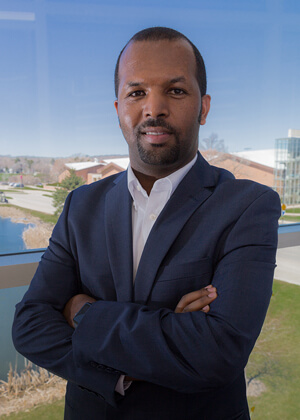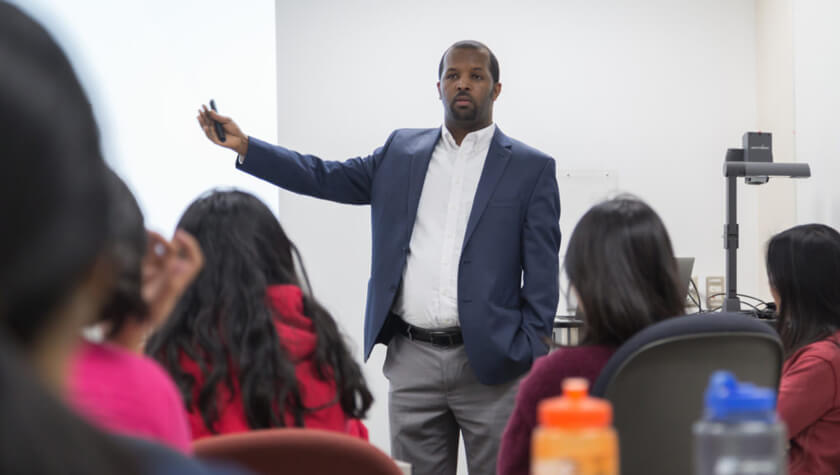Abebe’s chased his ambition to improve medication safety from Ethiopia to Madison
By Katie Gerhards
Pharmacists, because of their training and unparalleled accessibility, are often the first point of contact for patients, says Ephrem Abebe (MS ’14, PhD ’16).
“That means that our job as health care researchers and educators is to make sure that pharmacists are adequately supported,” he says. “We need to understand the work they do and develop better tools and strategies to assist them in patient care.”
Abebe came to the University of Wisconsin–Madison School of Pharmacy from Ethiopia, driven by the motivation to improve medication safety and pivot his career plans from pharmacy practice to research. After learning about the expertise in the renowned Social and Administrative Sciences in Pharmacy graduate program (now called Health Services Research in Pharmacy), he enrolled in the program and moved to the U.S.
“Safety is a core component of pharmacy training, and it felt natural for me to focus more closely on issues related to safety,” he says. “There are multiple gaps in our understanding of how we design and implement programs to enhance safety and quality of medication use by our patients, so I wanted to work toward developing strategies and tools to support these goals.”
After graduating with a new skillset, Abebe spent nearly three years as a postdoctoral research fellow at the Johns Hopkins Armstrong Institute for Patient Safety and Quality, where he helped lead an Agency for Healthcare Research and Quality-funded research project to improve medication safety during care transitions.
“An academic setting gives me the opportunity to thrive and impart knowledge and experience with students and colleagues as well.”
–Ephrem Abebe
Earlier this year, Abebe joined the Purdue University College of Pharmacy as an assistant professor, fulfilling his long-held goal of becoming a faculty member. “I get to continue to do research that is meaningful to health care systems and patients, which is a passion of mine, but at the same time, I get to teach and work with pharmacy students and graduate students,” he says.
Learn more about Abebe and his career in his own words:
Q: Why pharmacy?
As a high school student in Ethiopia, I had a great passion for chemistry, biology, and the basic sciences. But as I progressed through my high school career, I started to gain more of an interest in patient care and began learning more about medications. Pharmacy provided the right balance between those two areas I wanted to pursue. I also had a mentor at the time who was a pharmacy student, and I was inspired by him and what he was doing, so I enrolled in the pharmacy program at Addis Ababa University.
Q: How did you end up at UW–Madison from Ethiopia?
After graduating from pharmacy school in 2004, Addis Ababa University hired me as a graduate assistant but I left for India after a year of service to earn a master’s degree in pharmacy practice. After two years of studying abroad, I returned to Addis Ababa University where I was reinstated, promoted to be a lecturer and tasked with teaching clinical pharmacy courses as well as leading the newly fledgling clinical pharmacy program at the School. My work quickly evolved into working closely with physicians, nurses, and health care leaders within the other health profession schools and our teaching hospital.
That experience allowed me to understand some of the key issues that could be improved within health care. Then I realized that as a newly trained pharmacist with no research training, I felt that I didn’t have the toolkit I needed to make the type of impact I wanted on health care. That’s when I began to explore graduate training opportunities, which led me to the UW–Madison School of Pharmacy.
I was interested in doing research focused on medication safety, and I was looking for graduate programs that would combine traditional health services research with some engineering methods —specifically, I was looking for a human factors engineering approach to study safety in health care. I discovered the School had that exact program, so I applied and became a graduate student in the Social and Administrative Sciences in Pharmacy program, with Associate Professor Michelle Chui as my research mentor.

Q: Do you remember your first day as a student on campus?
It was a beautiful, sunny day — August 21, 2012 to be exact. It was very exciting to be in a new country, in a new culture, and at a great university that exceeded my expectations. Everyone was very supportive and kind, and I got the experience of a lifetime, so I couldn’t be more thankful about that.
In fact, before I came here, I had been talking to some people who had trained in the U.S., and I mentioned that I was going to UW–Madison for graduate school. They were very impressed. I specifically remember one woman saying, “UW–Madison is like the public ivy league school.”
I didn’t realize at the time the magnitude of the School’s reputation, but it continues to serve me well to this day. As a Wisconsin graduate, whenever I mention my alma mater, I can see the respect that my colleagues have on their face. People who come out of that graduate program earn high esteem among colleagues from other institutions, and a lot of the graduates are doing important work that influences policy, introduces new paradigms of research, and powers new discoveries and ways of doing things.
Q: What was it like to be Dr. Chui’s student?
One thing I really valued was how much her group worked as a team. When people come from different backgrounds and training environments, they bring different perspectives, which was a great benefit to our research. The experience broadened my perspective as a trained pharmacist.
She was a skilled leader of the team and it felt almost like a small family — everyone supported each other. We had lots of opportunities for professional development, such as getting experience writing manuscripts, which is essential as publications are one of the currencies of academia. I still reach out to Dr. Chui whenever I need any advice, and she’s always very generous with her time and feedback.
Q: Why did you decide to stay in academia?
I think my upbringing contributed to the decision. My parents were both teachers, so growing up in that household, I was always influenced by the idea of teaching and following in their footsteps. Then when I got the opportunity to work as a graduate assistant, I saw it as a way to combine pharmacy and teaching.
I enjoy that it’s an environment that helps fulfill my intellectual curiosity. I’m generally a very curious person, not just about pharmacy and pharmaceutical research, but also the history behind certain theories, buildings, people, significant events, and so forth. An academic setting gives me the opportunity to thrive and impart knowledge and experience with students and colleagues as well.
Q: What research projects are you working on now?
Because I just recently joined Purdue in March, I am mainly discussing some future research ideas with my new colleagues, trying to understand local health care needs, and finding collaborative ways to meet those needs. I am still focused on improving the safety of medications and making it easier for patients to navigate the health care system and get the services they need.

I have a few projects that I am hoping to get off the ground soon. One of them, for example, is focused on pediatric complex care. These patient populations have very complicated medical needs, and the children often have severe functional limitations, are dependent on some form of technology, and are on many, many medications, which become extremely difficult for parents to manage. Many of the parents are actually jobless because they’ve given up their work to take care of their children.
For an upcoming project, I will try to understand what that process is like for these patients and parents and develop some strategies or tools to make it a little easier for them.
I am also working on two other projects. In one, I have partnered with my oncology pharmacy colleagues and other members of the oncology care team at one of our affiliate hospitals to study safe management of cancer chemotherapy agents. In the other, I am collaborating with colleagues from Purdue’s College of Engineering to examine safety practices around use of intravenous infusion pump devices.
Q: What would you be doing if not pharmacy?
If not for pharmacy, I think I would be making documentary films, sharing the untold stories of people, places, and events. In a way, I am starting to do that now outside of my formal job — and with plans to incorporate film/visual storytelling in my research work in the near future. For the past two or three years, I have been teaching myself how to become a documentary filmmaker. I already have a couple of projects in the works now, in the very early stages.
Learn more about the recently renamed and reinvigorated Health Services Research in Pharmacy graduate degree program.